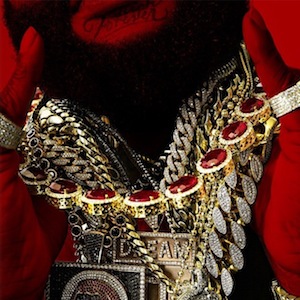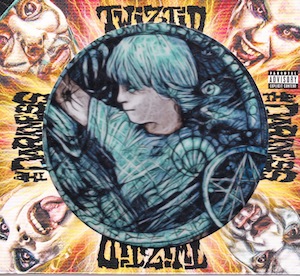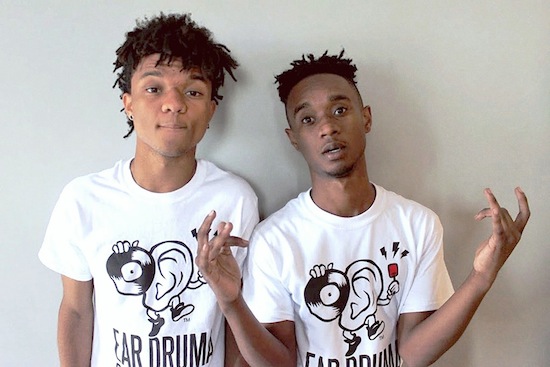It starts with a few plinking synthesizer keys and a producer drop, soon giving way to a deliriously catchy and relentlessly repetitive hook. Two young men trade verses, both adhering more or less to the same sing-song cadence as if compelled by force or deep induced trance. It’s the sound of something special, something fresh, something so goddamn new that it’s hard not to become stupefied by it.
Chief Keef and Lil Reese’s ‘I Don’t Like’ spread with pandemic intent and achieved a certain cultural ubiquity because it was damned good and inherently different. Unfortunately, it came with excess socioeconomic baggage, leading too many nagging opportunists and handwringing do-gooders to turn its popularity into a lame duck referendum on inner city violence. These arguments failed to grasp that the song’s popularity was a function of its DNA – nature not nurture.
Two millenial go-getters, Rae Sremmurd prove to be the genetically engineered solution. A sunny sibling to ‘I Don’t Like,’ their supremely safer and unproblematic ‘No Flex Zone’ lacks danger and venom whilst exuding that superb and superior newness. Sharing many of the same characteristics described above, theirs is just as rigidly formulaic as Keef and Reese’s breakout hit, the template equally as proprietary – credit due to Young Chop and Mike WiLL Made-It, respectively.
Setting aside Chop’s coincidental contribution to SremmLife (‘My X’), these new kiddies on the block thrive without credibility challenges or any need for trigger warnings. Neither Swae Lee nor Slimy Jimmy pretend to be drug kingpins or streetwise arms dealers. Like their spiritual forebears LMFAO, the boys just wanna have a good time. After all, to them swag is something you unlock as if in a video game. Their youthful spark still very much alight, Rae Sremmurd’s exuberance is played up throughout the album, often to the point of exploitation. Mike WiLL Made-It sets the album off with a child’s music box melody (‘Lit Like Bic’), while the gang more or less invents bubblegum trap with Honorable C.N.O.T.E.’s chiptune-esque closer ‘Safe Sex Pay Checks.’ Teen memes (‘This Could Be Us’) and voice cracking emotional outbursts (‘My X’) belie the fact that both just so happen to be of legal drinking age.
Apparently the key to success in contemporary hip hop is to sound as if suffering from testicular torsion. Even Big Sean seems to be pushing towards Young Thuggery nowadays (‘Yno’). Lee’s tone is just a five year lean addiction away from morphing into Lil Wayne’s ghastly nasality. But there’s just something so moving and impressive about the way pitch abuse beautifies the otherwise deathly sparse and airless space of ‘No Type.’
J Cole – 2014 Forest Hills Drive

It takes a lot of faith in your fanbase to expect them to pre-order an album without hearing a single note. Even with two successful full-lengths under his belt, a surprise J Cole album seemed a misguided marketing attempt. He’s nonetheless cultivated a willingly wallet-opening following that defies conventional label logic. The voice of a basic generation, Cole’s lack of persona that serves him so well. His relatable rhyming reinforces his ordinariness, a quality so many of his listeners obviously possess. Cole lacks a tangible gimmick, a point he lays out clearly and defensively on the combative ‘January 28th’. Ever fallible, on ‘Fire Squad’ he calls white rappers out by name for "snatching the sound". Surely he knows his audience isn’t one color, swiftly countering his Pop Pantherism with a sike-just-kiddin’ retraction. On ‘No Role Modelz,’ he laments not being old enough for Lisa Bonet while half-joking that Dr. Martin Luther King Jr. would be a Dreamville signee. We’re hard on Jermaine because we expect more from him. What does Cole actually stand for? Nothing – not that there’s anything wrong with that.
Rick Ross – Hood Billionaire

"This is so all bad, nothin’ good can come from this." Listen to your girl K. Michelle on ‘If They Knew,’ Rozay. She’s trying to tell you something. Reliant on the same sort of lumbering beats since ‘Hustlin’ first hit, the MMG bawse clearly doesn’t want to change. Unable to see the forest while smoking trees, he’s followed up last spring’s turgid and tiresome Mastermind with this extraneous full-length bookend. Again and again, Ross spits sour grapes over curdled beats, though his righteous bloodlust towards fellow Floridian George Zimmerman on ‘Burn’ hints that he’s not entirely on auto-pilot. Some of the producers do try to get blood from his stone. Big K.R.I.T. does his damnedest to suck some soul out of Rozay on ‘Brimstone,’ while trap beat wizard Metro Boomin offers up a creepy crawler that ultimately suffers from an unimaginative and banal hook. Planted mid-album, a pair of below-average Timbaland productions break up the monotony, though affixed to his unremarkable verses they raise more concerns than they ought. If a superpower can’t lift Ross out of the rap doldrums, what the hell will?
Thaiboy Digital – Tiger

Those eager to dismiss Yung Lean as a fluke or a one-off goof might be displeased to learn about Gravity Boys, a Sad Boys adjacent crew making similar Swedish sounds. A spiritual companion to Unknown Memory, Thaiboy Digital’s album revels in warbly Autotune affect and monotone croon, propped up by swirling syrupy electronica from the likes of Whitearmor. Beats are sometimes scarce on the lush productions, allowing the drifting android echoes of Thaiboy’s vocal to hold court (‘Moon,’ ‘No. 1’). But when the drums kick in on ‘Shadow Silence,’ it’s abundantly clear how vital and alive this strain of contemporary rap music is. Topically, this is the same sort of hip-hop flex zone regurgitation we’ve come to expect from the world, but the strange Euro euphoria of its cult vibe feels more sardonic than ironic. Gravity Boy fellow Bladee features prominently on the video game simulation ‘Gtblessgo,’ while Lean himself drops in for ‘Diamonds’ to big up Yoshi City. The final two cuts (‘Yr So Beautiful’, ‘Vän’) are trappy bassbin beauts capable of softening some of the hardest hearts in hip hop.
Twiztid – The Darkness

Any artist associated with the American Juggalo subculture tends to get facepainted with a broad brush. Serious critical assessment of those making music in the Insane Clown Posse’s orbit is conveniently scarce. After nearly twenty years of consistent existence, Twiztid’s latest album makes the strongest argument for proper assessment. Having split with ICP’s Psychopathic Records, the duo of Jamie Madrox and Monoxide Child still adhere to a formula of horrific themes over hip hop boom bap reinforced by B-movie level skits. Production on The Darkness is well executed, with beats more or less on par with what Eminem’s been spitting over in recent years (‘Boogieman,’ ‘On And On’). ‘Down Here’ is demonstrably better than anything Shady Records has peddled lately. It strikes me as odd that pop culture’s embrace of slasher flicks and cinematic ghost stories somehow hasn’t extended to music like the Ouija soul of ‘Seance’. Though overall Twiztid is unconvincing as a phenomenon, what they’re up to now is hardly as poor as some of ICP’s most dismal lows.
BONUS: One Hitters:
Joey Bada$$ – B4.DA.$$ The Brooklyn sensation’s stuffed crust debut, it encompasses everything you loved about 1994 hip hop from someone who wasn’t even alive when it happened.
The Brothers Slim – Dichotomy Capitalizing on cohort Father’s increasing profile, Messrs. Slim (Archibald and Rich Po) make a fair and not infrequently enjoyable case for a closer look at the prodigious Awful Records crew.
Jneiro Jarel – Flora Indie hip hop savant employs jittery electronic percussion and gleaming semi-organic melodies for this warped little diversion.
Ras G – Down To Earth Vol. 2 (The Standard Bap Edition)
His talents most suited to the tape format, this long distance dedication to the ol’ boom bap makes for the L.A. producer’s best yet.
Sadat X – Never Left While homophobia threatens to sully Brand Nubian’s legacy, Derek Murphy returns with this old school New York hip hop encomium.



